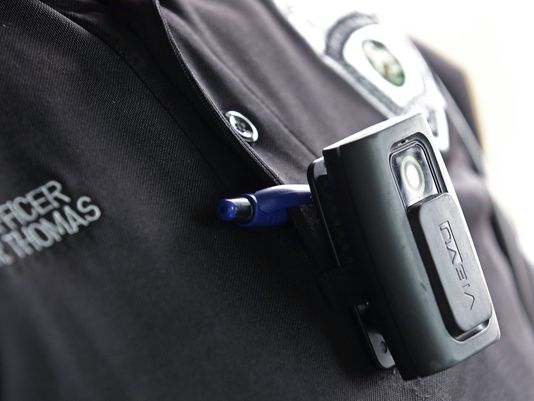Ellensburg Police Department considering body cameras for its officers

Courtesy of TSCELEB NEWS/Flickr
The Ellensburg Police Department could soon be wearing body cams like these.
January 28, 2016
The Ellensburg Police Department (EPD) is looking to implement the use of body cameras, depending on whether the privacy issues associated with body camera use are addressed by the state.
According to Captain Dan Hansberry of the EPD, dash cams have been in use for the past 10 years in his department and their future goal is to implement the use of body cameras.
“Body cameras take it to the next level,” Hansberry said.
Following the recent wave of passed legislation, the U.S. House Judiciary Committee proposed a new bill aimed to create guidelines for body camera use by the police in Washington. The bill, House Bill 2362, has garnered both criticism and praise.
“There’s great public concern now about making police more accountable to the public and about reducing incidents of police force against people,” said Doug Honig, communications director for the Washington State ACLU. “Body cameras are being offered as a solution.”
Drew Hansen, democrat representative of Bainbridge Island and one of the main sponsors of House Bill 2362, made it clear the point of the bill was not to require or prohibit the use of body cameras, but to create guidelines for their use.
The guidelines laid out in the bill require departments to develop policies on when a body camera must be worn and when an officer can turn the camera off.
In response to skepticism of the effectiveness of this potential policy, Hansen referenced another part of the bill stating that a task force will work over the next two years to determine if the potential policy will be effective.
Parties who testified in support of the bill came from several cities, including Olympia and Bellingham.
Kelley Busey, police chief of the Gig Harbor Police Department, was among those testifying in support of the bill.
However, there is a significant amount of criticism toward the law.
Honig said the law “doesn’t provide adequate regulation for body camera use.”
The ACLU is seeking the creation of a task force to address the privacy of the public when being recorded and when cameras can be turned on and off instead of reforming the bill.
“In protecting personal privacy, it has to be done in way that also makes footage available when there are disputes,” Honig said.
Hansberry echoed some of the ACLU’s criticism in terms of privacy, warning that the general public would have access to any information that may be considered private and “a lot of it we wouldn’t be allowed to redact out.”
It would be a “public disclosure nightmare,” he said.
Implementation of body cameras within the police department is partially dependent on issues of privacy. It was confirmed that when body cameras are implemented, they would be on all uniformed patrol officers.
Hansberry said the EPD strives “to be as open and transparent as you possibly can.”
While a large amount of criticism toward the bill revolves around privacy issues, the bill actually provides protection of the privacy of certain individuals.
Certain information and footage will be exempt from public inspection. This includes private information that could reveal the person’s identity and put them in danger, or any information revealing the identify of child sexual assault victims.
Despite the all criticism of the bill, Hansen has remained confident in his legislation.
Several representatives from communities with a more diverse population were consulted on this issue.
According to Hansen, the effect of body cameras is very different in different communities, but has generally been a positive experience.
When reviewing this bill and when future issues arise, Honig wants the public to understand that, around the country, there are still incidents where officers had cameras that weren’t turned on when an incident occurred.
“Body cameras aren’t some magic solution,” Honig said.


